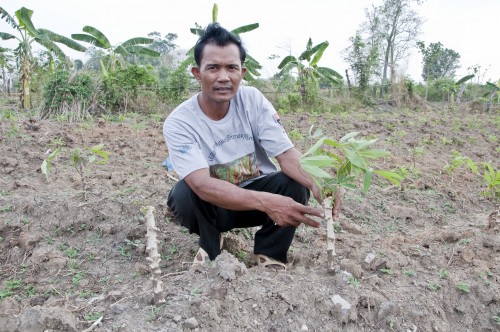IRDEP-BB – Though the demining work has not yet been completed, farmers whose lands were cleared started to benefit from the demining project in Manaskal village in Kamrieng district of Battambang province.
 |
 |
Funded by FinnChurch Aid (FCA) and facilitated by LWD, the demining project which was implemented by Mine Advisory Group (MAG) in collaboration with the government’s Mine Action Planning Unit and the local authorities, started in early October 2009. The total areas to be demined are 51,898 square meters. There are 116 families living in the village. The number of families whose land has landmines underground is 10. As of late 2011, MAG has demined about 75% of the total areas and the rest is expected to be completed in April next year.
Because of the needs of farmlands, five of the ten families whose lands have been demined could not wait until the completion of the project. They started right away to grow cassava in early 2011 just as they were informed by the demining team that their land were safe.
Nam Sam Oul, 47, one of the five families whose land was cleared and member of the Village Development Committee (VDC), said he was very happy to hear that his half hectare of land which was left idle for nine years because of landmines was safe for cultivation.
With strong confidence, Sam Oul decided to invest a capital of US$90 to grow cassavas on the newly-cleared land in early 2011. After harvest in December of the year, he earned a net income of $US360. He said he planned to grow the same crop again early next year.
With the income from the sale of cassavas combined with other incomes he generated from growing corns and green beans, he could repay a loan of US$1,000 (with 10% interest rate per month) he borrowed from a private money lender in the village.
Chea Rom, former VDC Chief, whose land was cleared in the first phase in early 2010, said he benefited from his demined land (sized 40m x 80m) two years ago. He said he grew cassavas on half of his land size andearned a net income of about US$150 from selling cassavas each year.
Rom said he grew corns on his farm for 3 years before the demining project started. One day, after ploughing he found two landmines appeared on his land. Though Rom knew that his farm has landmines underground, he still took risks to work on it because he had no alternative.
But, today he is no longer afraid of danger. “Now, I can work on my farmland without fear,” he said.
Six villagers have been injured by landmines since 1997, while the rest of them are living in fears and cultivating at risk on their mined land without alternatives.
LWF/LWD’s Demining Project, which funded by FCA/Ministry of Foreign Affairs since 1998, aimed to relieve human suffering caused by landmines and UXO contamination, to improve the standard of living of the repatriated families and enable long-term and sustainable development.
From 2006-2011, the humanitarian aid for demining project funded by FCA/MFA through LWF/LWD totaled EUR 1,494,000.
